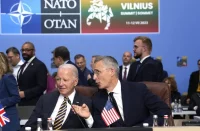Washington appears to be in the driver’s seat in the Ukrainian conflict. That is clear not only from the rude comments by Under Secretary of State Victoria Nuland in the month before the overthrow of Yanukovich but also from the various initiatives that Washington continues to generate, including the most recent proposal to arm Ukraine with lethal weapons, or its effective veto on various sensible proposals coming from Russia, be it the November 2013 Russian offer of tripartite negotiations between Russia, Ukraine and EU, or the call for federalization of Ukraine, notwithstanding Europe’s apparent support for these ideas.
It is clear that geography is destiny and it is up to Europeans to try to solve the crisis now unfolding in the very heart of Europe. The US obviously has its geopolitical interests to maintain, but it has to let Europeans, Ukrainians and Russians solve this quagmire. As US trusted allies, Europeans have to ask the US to wait on the sidelines, or to use my driving metaphor – the US has to let Europeans get into the driver’s seat. After all, it was Europeans who had to deal with Russia for centuries.
I am sure this will happen eventually, but it appears to me that the US is not ready to be relegated to the backseat position on this or on any other issue right now. That’s called imperial overreach. Russia clearly has difficulties dealing with its lost status, but by the same token the US appears to have its own set of difficulties. In other words, in its need to assert itself in various conflicts and various parts of the world, Russia might act like a sore loser, but the US clearly failed to act as a gracious winner. It keeps on insisting on its superior status, on its winner’s rights to dictate and re-shape reality. In short, it demonstrates all the faults of winners –stiffened self-righteousness, arrogance, and failure to modify and change.

Of course, being the most powerful country in the world, the US can continue to run the show relying on its hard power, on its eavesdropping equipment, and on its bribing or bullying of European leaders. But this is the Soviet way, rather than America’s past reliance on the power of ideas and ideals. We know that the former Warsaw bloc eventually collapsed like a house of cards, because of the way the Soviet Union chose to rule. The countries that form NATO can very easily repeat the scenario of their predecessors in the Warsaw bloc.
European countries gravitate toward each other and this process is inevitable. Had the US continued to be a true leader of the Free World, the country that inspires the world by the care that it takes of its citizens, by its ability to control unruly businesses or financial institutions, by its courage and vision in confronting the world problems– then Europeans would more than happy to follow such a lead. But with its victory in the Cold War, the US abandoned vision and ideals, resorting instead to raw power. By its equally aggressive defense of its geopolitical interests, which were challenged by the US for no obvious reasons except for the need to spread its own hard power, Russia has managed to call the US bluff. The United States has to demonstrate to the rest of the world how it intends to lead: through its moral superiority and its vision or through its hard power and tired rhetoric. Common sense tells us that a system that relies on armies, bases, bombers, and spying on its allies coupled with dismissal of environmental, financial, or economic concerns of the rest of the world, stands in very drastic need of change.
Recent US policies are becoming increasing myopic and self-righteous, consequently, moral support for the US is diminishing. If people like me, who came to the US solely for the political reasons, and who have both benefited from and continue to admire the great American principles of liberty and fair play, begin to feel disappointment, if the countries which have always been staunch supporters of the US, be it Hungary or the Czech republic, are showing signs of independence – what about the rest of the world, including so-called Old Europe that has always been wary of US unilateral policies? Is it worthy to lose Old Europe, Germany and France in particular, for the sake of gaining Ukraine, a country torn apart by civil war, financial mismanagement and virulent nationalism? That would clearly be a Pyrrhic victory, if there ever was one.
Vladimir Golstein is the Associate Professor of Slavic Languages and Literatures, Department of Slavic Studies at Brown University. He was born in Moscow and emigrated to the United States in 1979
Source: US-Russia.org














Pingback: Russia – West Confrontation: Ways Out | Infowars Ireland